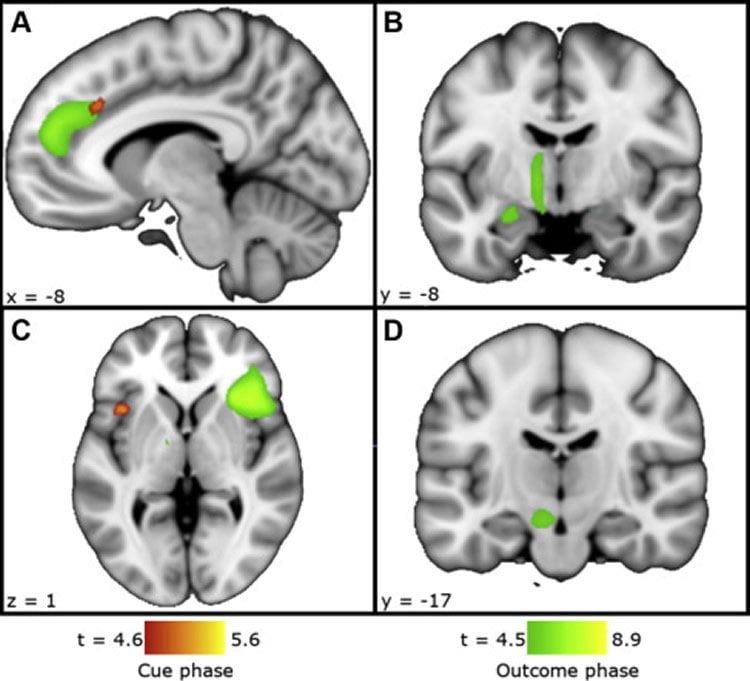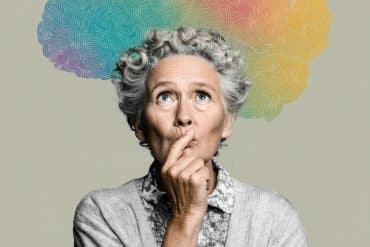Summary: Researchers report personality traits and psychological health impact how we value personal control when making decisions. The study reports brain activity in the motivation system is dampened in those with passive personalities and depression when we receive rewards that we have earned or feel in personal control of situations.
Source: Elsevier.
Personality traits and mental health affect how people value personal control in decision making, according to a new study in Biological Psychiatry: Cognitive Neuroscience and Neuroimaging. Our brain’s reward and motivation systems show higher activity when we feel personal control in a situation and when we receive rewards that we’ve earned, rather than been given–but this activity was dampened in people with passive personalities or with symptoms of depression. The connections between personality, choice, and depression may help guide researchers to understand how to protect healthy people from developing the illness..
“This study, which used computational models of reward behaviors and functional MRI, represents an advance in our understanding of how rewards shape choices in the brains of healthy individuals,” said Cameron Carter, MD, Editor of Biological Psychiatry: Cognitive Neuroscience and Neuroimaging.
In the study, the researchers used an MRI scanner to measure the brain activity of 122 healthy participants while the participants played a computer game to earn rewards. “We were interested to see how people value rewarding outcomes based on their own personally-driven decisions, versus those that are decided for them by the computer,” said first-author Liana Romaniuk, PhD, University of Edinburgh.

“We found that an area that is important for motivation and learning by trial-and-error–the ventral striatum–was especially active when people were told they were going to get to make a decision,” said Dr. Romaniuk.
Although all of the participants in the study were considered healthy, the researchers looked for relationships between the brain activity and symptoms of depression. Activation in the ventral striatum was reduced in people with some symptoms of depression, which may help explain why people with depression lose their motivation.
“Since these brain networks were differentially active in the presence of subclinical depressive symptoms, it suggests a future role for functional brain imaging in understanding individual differences in mental wellness and in informing early intervention and prevention of mood disorders,” said Dr. Carter.
The findings also provide clues as to how personality might make a person susceptible to depression. “People who were more self-motivated had stronger responses to personally-earned rewards in a region of cortex called the insula, whereas more passive people showed the opposite,” said Dr. Romaniuk, adding that “The insula is important because we know its function is altered in people with depression.”
Source: Rhiannon Bugno – Elsevier
Publisher: Organized by NeuroscienceNews.com.
Image Source: NeuroscienceNews.com image is credited to Romaniuk et al.
Original Research: Open access research for “The Neurobiology of Personal Control During Reward Learning and Its Relationship to Mood” by Liana Romaniuk, Anca-Larisa Sandu, Gordon D. Waiter, Christopher J. McNeil, Shen Xueyi, Matthew A. Harris, Jennifer A. Macfarlane, Stephen M. Lawrie, Ian J. Deary, Alison D. Murray, Mauricio R. Delgado, J. Douglas Steele, Andrew M. McIntosh, and Heather C. Whalley in Biological Psychiatry: Cognitive Neuroscience and Neuroimaging. Published October 9 2018.
doi:10.1016/j.bpsc.2018.09.015
[cbtabs][cbtab title=”MLA”]Elsevier”Personality and Mood Affect Brain Response to Personal Choice.” NeuroscienceNews. NeuroscienceNews, 20 November 2018.
<https://neurosciencenews.com/personal-choice-mood-10234/>.[/cbtab][cbtab title=”APA”]Elsevier(2018, November 20). Personality and Mood Affect Brain Response to Personal Choice. NeuroscienceNews. Retrieved November 20, 2018 from https://neurosciencenews.com/personal-choice-mood-10234/[/cbtab][cbtab title=”Chicago”]Elsevier”Personality and Mood Affect Brain Response to Personal Choice.” https://neurosciencenews.com/personal-choice-mood-10234/ (accessed November 20, 2018).[/cbtab][/cbtabs]
Abstract
The Neurobiology of Personal Control During Reward Learning and Its Relationship to Mood
Background
The majority of reward learning neuroimaging studies have not focused on the motivational aspects of behavior, such as the inherent value placed on choice itself. The experience and affective value of personal control may have particular relevance for psychiatric disorders, including depression.
Methods
We adapted a functional magnetic resonance imaging reward task that probed the value placed on exerting control over one’s decisions, termed choice value, in 122 healthy participants. We examined activation associated with choice value; personally chosen versus passively received rewards; and reinforcement learning metrics, such as prediction error. Relationships were tested between measures of motivational orientation (categorized as autonomy, control, and impersonal) and subclinical depressive symptoms.
Results
Anticipating personal choice activated left insula, cingulate, right inferior frontal cortex, and ventral striatum (pfamilywise error–corrected < .05). Ventral striatal activations to choice were diminished in participants with subclinical depressive symptoms. Personally chosen rewards were associated with greater activation of the insula and inferior frontal gyrus, cingulate cortex, hippocampus, thalamus, and substantia nigra compared with rewards that were passively received. In participants who felt they had little control over their own behavior (impersonal orientation), prediction error signals in nucleus accumbens were stronger during passive trials.
Conclusions
Previous findings regarding personal choice have been verified and advanced through the use of both reinforcement learning models and correlations with psychopathology. Personal choice has an impact on the extended reward network, potentially allowing these clinically important areas to be addressed in ways more relevant to personality styles, self-esteem, and symptoms such as motivational anhedonia.






